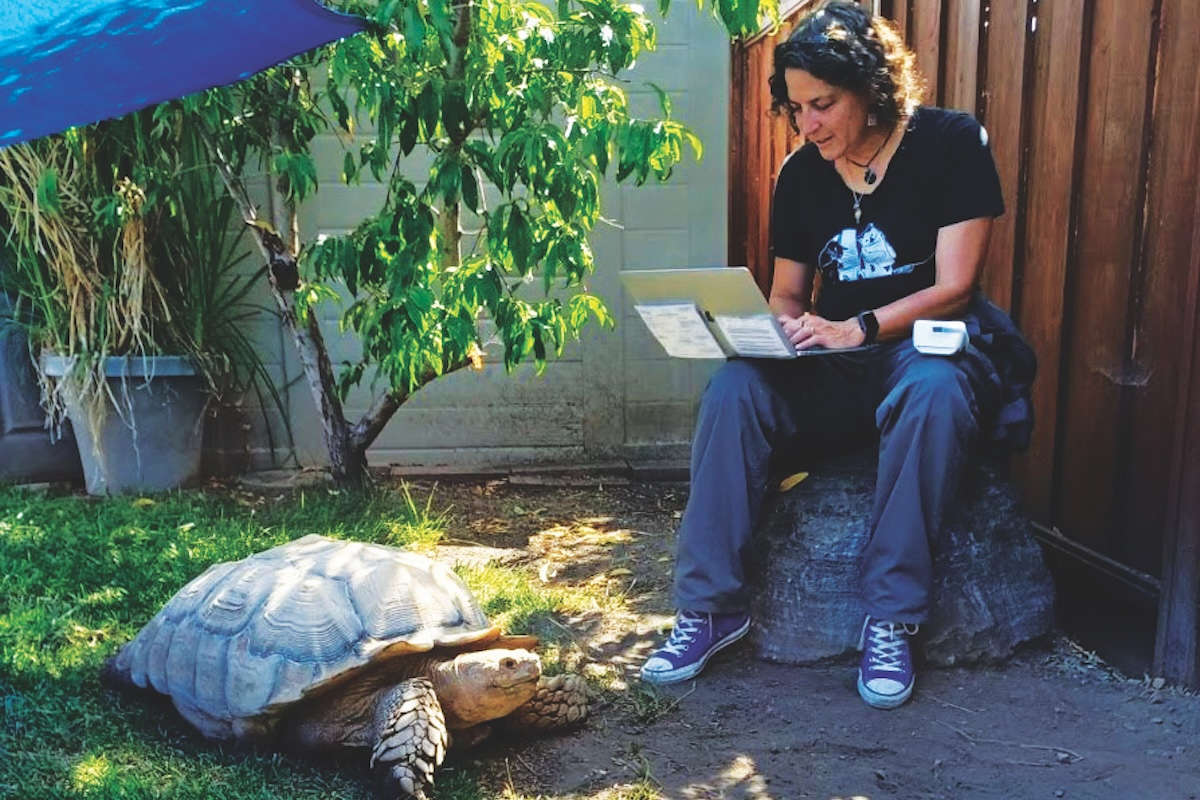If Bugs Bunny were injured or sick, he would need to see a doc who specializes in the treatment of exotic animals.
Rabbits, potbellied pigs, birds, reptiles, amphibians, guinea pigs, rats, mice, hamsters, turtles and chinchillas are among a wide range of pets classified as “exotics.” Multiple sources define these as “any animal that is not commonly kept but can be domesticated and kept by an owner.”
Many of these animals make good pets if properly cared for. But not all vets accept exotics as patients, because varied and specialized training is required. Fortunately, the East Bay has several qualified practitioners.
Dr. Linda Siperstein, known to pet parents as “Dr. Sip,” is a Bay Area native who returned to Oakland after earning her DVM from Tufts University School of Veterinary Medicine in Massachusetts. She currently heads a house-call practice, serving most of the East Bay, because she believes that animals, especially exotics, benefit from receiving less-stressful care in their homes.
The most common patients she treats, she said, are rabbits, reptiles and birds. But she has also cared for everything from guinea pigs, rats and chinchillas, to parakeets and parrots, among other species.
She recommends exotic pets be seen twice a year by a qualified vet. “Depending on the species, they often have a shorter life span [than cats and dogs], so prompt care is essential,” she said. “Also, they are very good at hiding illnesses, especially prey species.”
These animals instinctively know that shown weakness can lead to predator attacks in the wild, she said, so they may deliberately not present symptoms that a vet can detect. Also, veterinary science continues to advance, now recommending annual vaccination for rabbits to protect against myxomatosis, rabbit haemorrhagic disease 1 (RHD1) and rabbit haemorrhagic disease 2 (RHD2).
Asked about the most common mistakes she sees in home care being given to exotic pets, Siperstein noted she sees pets not being appropriately housed; upkeep not being maintained regularly; and, for reptiles, light and heat needs not being properly addressed. Most reptiles require exposure to UVB lighting in their enclosures to increase calcium absorption, and if they don’t get enough exposure time, can develop metabolic bone disease.
Also, she said, many pets need enrichment opportunities and toys, widely available through many outlets now.
People truly do love their unusual pets, and want the best for them. “I have [a client couple] who have two guinea pigs, and every holiday season [the guinea pigs] are featured on the card. They are such a great joy to their owners,” she said.
Another vet specializing in exotics can be reached through Berkeley’s PETS Referral Center. Dr. Molly Gleeson treats many non-traditional pets. She is board-certified in zoological companion animal practice and treats a wide range of pets, including rabbits and other small mammals, reptiles and birds, among others. Gleeson also recommends at least one yearly exam for exotic pets, and one every six months for short-lived animals.
Yet another Berkeley resource is the Campus Veterinary Clinic, where Dr. Patrick Pierson and Dr. Katie Lee offer care for “pocket pets,” including guinea pigs, hamsters, rats, mice and chinchillas. Pierson also accepts rabbits as patients.
The East Bay Vivarium, a store selling reptiles, has a tab on its site for vet referrals, which includes PETS Referral Service, as well as other clinics in the greater East Bay.
Qualified fish vets are rare, but the site Find-A-Fish-Vet recommends VCA All Pets Hospital in San Francisco, which can be reached at 415.727.9116 or www.somaanimalhospital.com. Dr. Gleeson also treats fish.
Many animals cannot be legally kept as pets in California, although they are legal in other states. These include ferrets, hedgehogs, gerbils, monkeys and chimps, Quaker parakeets and desert tortoises. One example of a California animal/pet law is: “It is illegal for anyone to take a tortoise from the desert, or to buy or sell one. In California, anyone who has possession of a desert tortoise must have a special permit.”
Yet exotic pet vets, including those interviewed, would rather see a beloved pet, legal or not, treated with expert care, rather than left untreated. But California laws, despite being rarely enforced, should be reviewed by anyone considering a pet classified as “exotic.”











